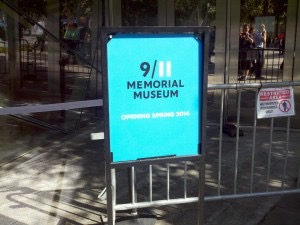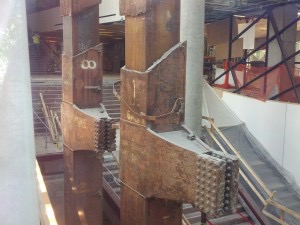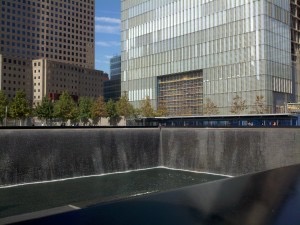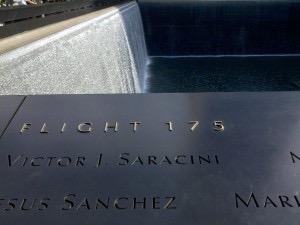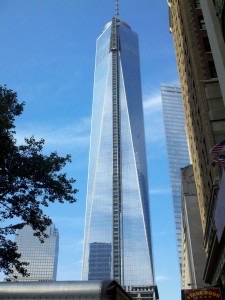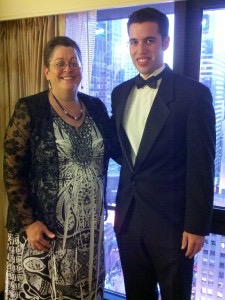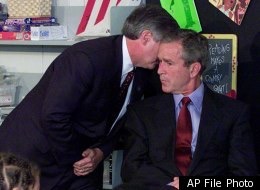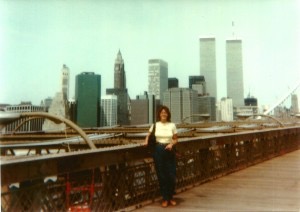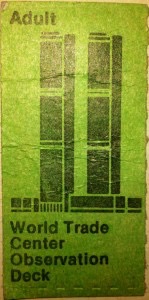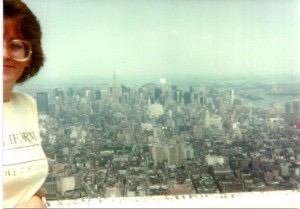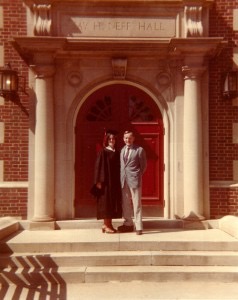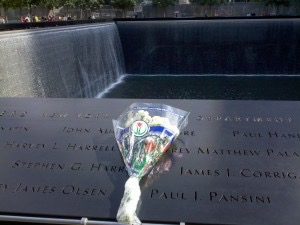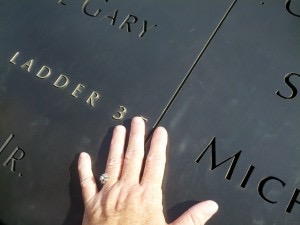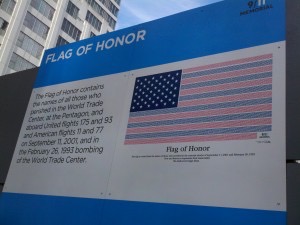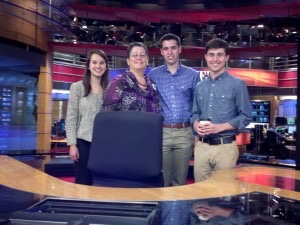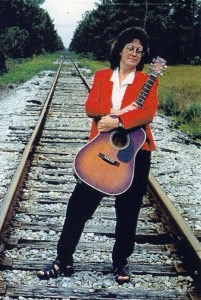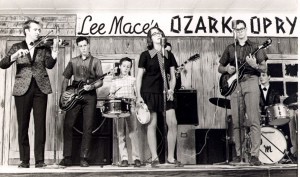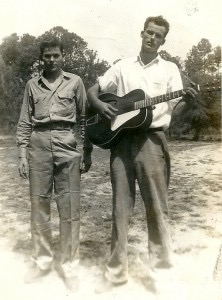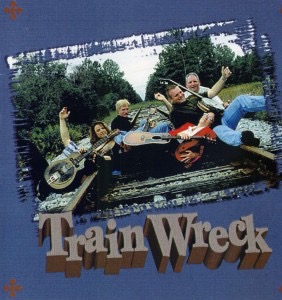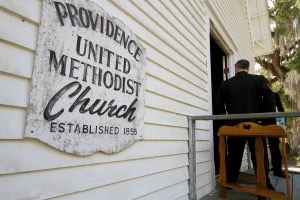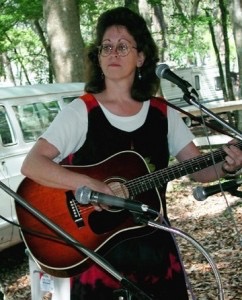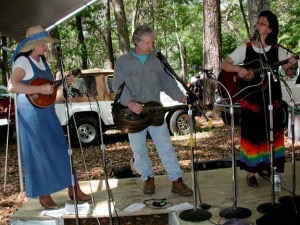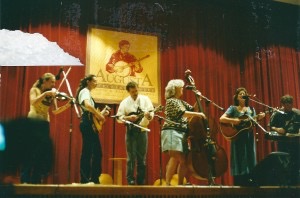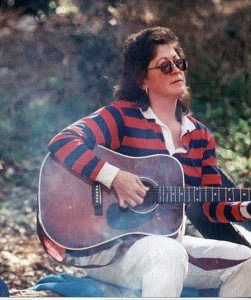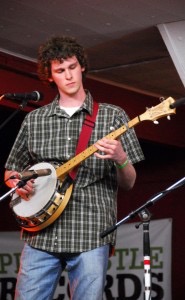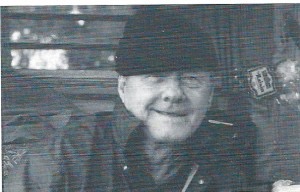
By the time I met Will McLean he had already penned most of the hundreds of songs and poems he has become famous for. He’d already performed at Carnegie Hall and made friends with the late Pete Seeger. His glory days performing on the “Old Marble Stage” at the Florida Folk Festival were long since past. The truth is, the day I met him I didn’t even really know him by name. But I think therein lies the reason we became fast friends. Will McLean was one of the most humble men I’d ever met.
It was in mid-November in 1985. I was working in the WUFT-FM newsroom in Weimer Hall at the University of Florida when a tall man dressed all in black (that’s how I remember it) walked into my office and kindly, almost demurely, asked if he could post some fliers on the bulletin boards in the hallway to promote his concert that was to take place that following Sunday night November 17th in the Thomas Center in downtown Gainesville. Just having someone come in and ask to post something was rare. Thinking back on it, I’m surprised I didn’t just say yes or no. I remember being intrigued by this man because of the soft-spoken way in which he asked me. Maybe it was the way he was dressed and his stature that caused me to begin asking him questions, questions that today I’m a bit embarrassed that I asked, but so glad I did.
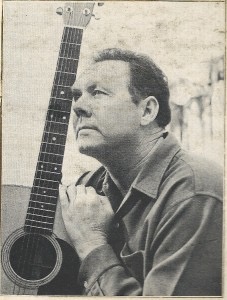
I remember questioning him about what kind of songs he’d written. Instead of being surprised and offended that I didn’t know who he was he began to softly tell me some of the song titles and what they were about. That’s where my friendship with Will McLean really began. When he got to the song, “Hold Back the Waters,” my heart actually fluttered. I had no idea how popular that song really was or the true history behind the song of the 1928 hurricane in Florida over Lake Okeechobee. Geez, people in Florida had been singing this song like an anthem for more than 20 years. But in 1985 I had only been living in Florida for a little more than two years and was just getting to know Florida history and area musicians. But, I knew that song. I fell in love with “Hold Back The Waters” when I was helping produce a national music series while out in the state of Kansas called, “The Walnut Valley Festival.” The public radio station I was working for as news director, KHCC-FM, had produced 26 one-hour programs for national distribution.
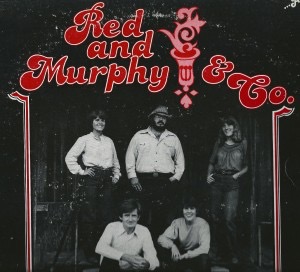
My job was to interview all the musicians and produce features for the series. It was my first real introduction to a genre of music you just don’t come across on the radio every day. One of the groups performing in 1982 was Red and Murphy Henry, a bluegrass family band from Florida (now Virginia). I can distinctly remember Murphy Henry introducing the song, Hold Back The Waters, saying it was about a hurricane. Of all the songs I heard at the Walnut Valley Festival those two years in the early 1980s, this was the one song I sat down and wrote out the lyrics to and learned to sing. Listening back to the original tape I can hear Murphy Henry mentioning Will McLean’s name, but at the time I learned it I wasn’t as interested in the artist who wrote it as much as in the story of this devastating storm that pushed Lake Okeechobee’s waters over its banks and drowned between 3,000 to 4,000 people.
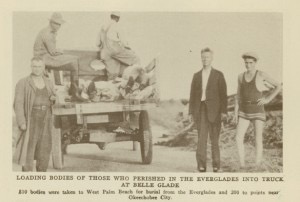 The 1928 storm was before television and the weather channel and before hurricanes even had names. It intrigued me that the Seminoles living in Florida may have warned the storm was coming but people didn’t pay attention. This storm is the reason there is now a dike all around Lake Okeechobee in South Florida. There are many accounts from people recalling the storm describing how they were tied to trees by their families so they wouldn’t be swept away. There are stories about the mass graves following the storm….some marked and some unmarked. Yes, this was an intriguing song about history and my first introduction to what hurricanes could really do.
The 1928 storm was before television and the weather channel and before hurricanes even had names. It intrigued me that the Seminoles living in Florida may have warned the storm was coming but people didn’t pay attention. This storm is the reason there is now a dike all around Lake Okeechobee in South Florida. There are many accounts from people recalling the storm describing how they were tied to trees by their families so they wouldn’t be swept away. There are stories about the mass graves following the storm….some marked and some unmarked. Yes, this was an intriguing song about history and my first introduction to what hurricanes could really do.
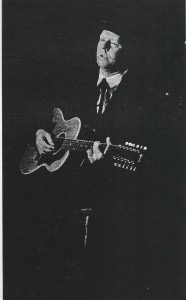
I loved “Hold Back The Waters.” As soon as Will McLean mentioned it I remember blurting out, “I know that song.” When I told him where I first heard it his eyes just lit up. I wasn’t prepared for him to then ask, “Why don’t you come to my concert and sing it with me.” He had just met me. He didn’t know if I could sing or not. I’m sure I thanked him kindly for asking, but he surely didn’t need me to come and sing. It was his concert after all. He insisted.
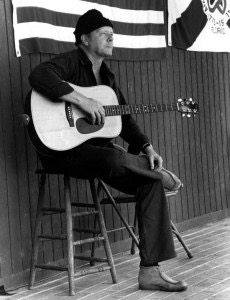 Before he left the station I introduced him to our operations manager and our chief engineer and it was decided that WUFT would send its remote recording truck to the concert. I remember sitting in a little room at the Thomas Center that night in November of 1985 practicing the song with Will. I was so afraid I’d forget the words or forget how to play it on my guitar. My fears were relieved when I saw Murphy Henry walk into the Thomas Center, the person I first heard sing the song out in Kansas. It turned out that I didn’t have to worry about playing the guitar, I only had to sing the song with Will and Murphy. My fears about forgetting the words disappeared. Here is the introduction to the song that night in 1985
Before he left the station I introduced him to our operations manager and our chief engineer and it was decided that WUFT would send its remote recording truck to the concert. I remember sitting in a little room at the Thomas Center that night in November of 1985 practicing the song with Will. I was so afraid I’d forget the words or forget how to play it on my guitar. My fears were relieved when I saw Murphy Henry walk into the Thomas Center, the person I first heard sing the song out in Kansas. It turned out that I didn’t have to worry about playing the guitar, I only had to sing the song with Will and Murphy. My fears about forgetting the words disappeared. Here is the introduction to the song that night in 1985
and here’s the recording of Will McLean, Murphy Henry and me singing “Hold Back The Waters.”
In 1985 I was engaged to be married to Lee Townsend from Cross Creek. He was with me at the Thomas Center. As it turns out, Lee knew Will for a different reason. When he was working as a mechanic in Gainesville he often worked on Will’s old vehicles, doing his best to keep them running, many long after they should have been abandoned. That night Will dedicated a poem to us. It was a poem so appropriate for a couple who lived in the woods in Cross Creek.
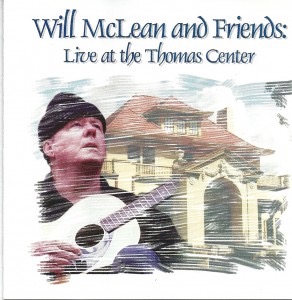 I will only say that following that November concert, for whatever reason, that professional recording got stashed away on a shelf and misplaced for nearly 12 years….a whole different story in itself. Eventually, it resurfaced at just the right time because the new program director at WUFT-FM, Bill Beckett, had an appreciation for what this recording meant to history. Working together with the Executive Director of the Will McLean Foundation, Margaret Longhill, we turned the recording into the CD, “Will McLean and Friends, Live at the Thomas Center.” I met Margaret Longhill the same week I met Will in 1985. She truly understood how rare this professional recording of Will McLean was. We’ve been friends now for nearly 32 years.
I will only say that following that November concert, for whatever reason, that professional recording got stashed away on a shelf and misplaced for nearly 12 years….a whole different story in itself. Eventually, it resurfaced at just the right time because the new program director at WUFT-FM, Bill Beckett, had an appreciation for what this recording meant to history. Working together with the Executive Director of the Will McLean Foundation, Margaret Longhill, we turned the recording into the CD, “Will McLean and Friends, Live at the Thomas Center.” I met Margaret Longhill the same week I met Will in 1985. She truly understood how rare this professional recording of Will McLean was. We’ve been friends now for nearly 32 years.
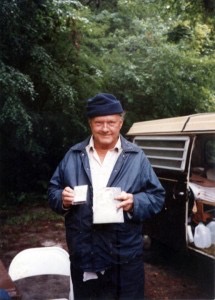
Because of the way Will McLean lived, he had very few possessions. After his wife Alice died of cancer Will spent most of his last years travelling around in an old beat up van and hanging out at campgrounds where he could fish or just plug in his extension cord at the homes of various friends. He pawned many of his guitars to obtain money to buy wine and he gave away cassette tapes of his recordings to just about everyone he met. I think he enjoyed revisiting the places around Florida where his grandpa had taken him as a boy. Those trips were the inspiration for many of his songs and poems.
Not all of the stories about Will McLean are pretty, but he was a unique individual….a treasure. About a month after the Thomas Center concert Will came to Cross Creek to help me celebrate my 28th birthday. I remember having a nice little music jam on my screened porch over Cross Creek. What I also remember is that Will chose to just sit back and listen to everyone else sing and play, not wanting to be in the spotlight. As much as I wanted him to play for us, I can now look back and appreciate how he didn’t want to be center stage the way some musicians do. I liked that quality in him.
The same thing happened on March 15, 1986 at my wedding reception in Cross Creek. Someone told me Will McLean had just arrived and was looking for me. He had a wedding present for my husband Lee and me. It was a cassette full of recordings he had made around the campfires at the Florida Folk Festival and other places. Not wanting to be the focus of my wedding reception he kindly gave us his “best wishes” and disappeared. After getting to know Will better over the coming months I invited him into the WUFT studios to do a long interview in 1987. You can hear my first interview with Will in 1985 when I was just getting to know him and the second interview where I knew Will a little better by clicking here. Let’s just say I’m really glad I have those recordings. There are stories in those interviews that needed to be preserved forever.
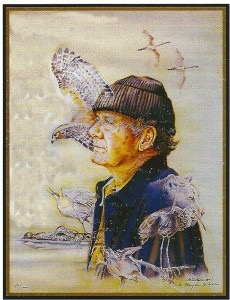
Will died in 1990 from cancer. Friends gathered for his memorial in the Thomas Center, the same venue where I sang with him less than five years before. Both floors of the Thomas Center were packed. Many of his friends performed Will’s songs and told stories of how they knew him including the late Gamble Rogers, Don Grooms, Bobby Hicks, Dale Crider, Seminole Chief James Billie, Jeanie Fitchen, Mary Ann Dinella, Doug Gauss, Dennis Devine and Wayne Martin. The list is long. There were tears and much laughter as well. I don’t think I’ve ever cried so hard. He touched so many of us in so many ways. This is the first time I’ve ever really written my thoughts about it. Thank goodness someone actually video-taped the service. It is a real treasure to see.
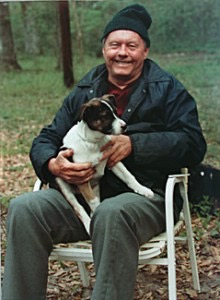 Afterwards many of us went to Gore’s Landing by the Ocklawaha River to disperse Will’s ashes. Some of those in attendance were Margaret Longhill, Don Grooms, Dale Crider and family, Donna Green-Townsend and family, Wayne Martin, and Bobby Hicks to name a few. Gore’s Landing was one of Will’s favorite places to camp. I saw him there while my family was also camping not long before he got so sick.
Afterwards many of us went to Gore’s Landing by the Ocklawaha River to disperse Will’s ashes. Some of those in attendance were Margaret Longhill, Don Grooms, Dale Crider and family, Donna Green-Townsend and family, Wayne Martin, and Bobby Hicks to name a few. Gore’s Landing was one of Will’s favorite places to camp. I saw him there while my family was also camping not long before he got so sick.
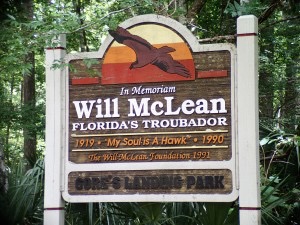
Margaret Longhill chose the Ocklawaha River because before he died, McLean had told her that he had hoped to light a small campfire one last time at Gore’s Landing, his favorite campsite. In this brief recording, you will hear a small portion of that special ceremony at the river:

In 1996, because of his artistic contributions, Will became the first folk artist inducted into the prestigious Florida Artists Hall of Fame.
One of the highlights of the festival is the hour when the winners of the Will McLean Best New Florida Song Contest perform their winning songs. Will always wanted to “Save Florida Through Music.” It’s amazing how many songs there are now about his beloved “Florida Sand.”
If you’ve never been to the Will McLean Folk Festival you really should check it out. It’s truly a “songwriters festival.” Mark your calendars for the next one scheduled for Friday, March 13th – Sunday, March 15th, 2026. It’s held at the Florida Sand Music Ranch Ranch near Brooksville and just 7 miles west of Dade City. It’s small in comparison to many music festivals, but that’s why it’s so special. The performers and the people who attend are all in the same campground, playing music throughout the night.
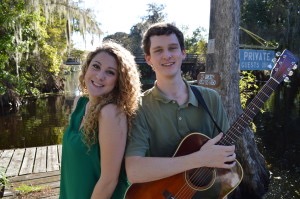
My children have grown up there. In 2016 my son Lee and daughter Jessie Townsend performed on both Saturday and Sunday at the festival and honored many songwriters who have passed on in a special “Florida Set.”
I love sharing the legacy of Will McLean with the younger generation. That being said, I can’t tell you how sweet it is that my granddaughter literally fell in love with one of Will’s songs as an infant. If she was crying, it soothed her. When she began to talk, she asked for the song to be played. By the age of two she was singing the words with her Aunt Jessie and Uncle Lee. Here’s a version of them singing it together.
As the late singer-songwriter Pete Seeger said, “Will McLean’s songs will be sung as long as there is a Florida.” Rest in Peace Will McLean, my friend.
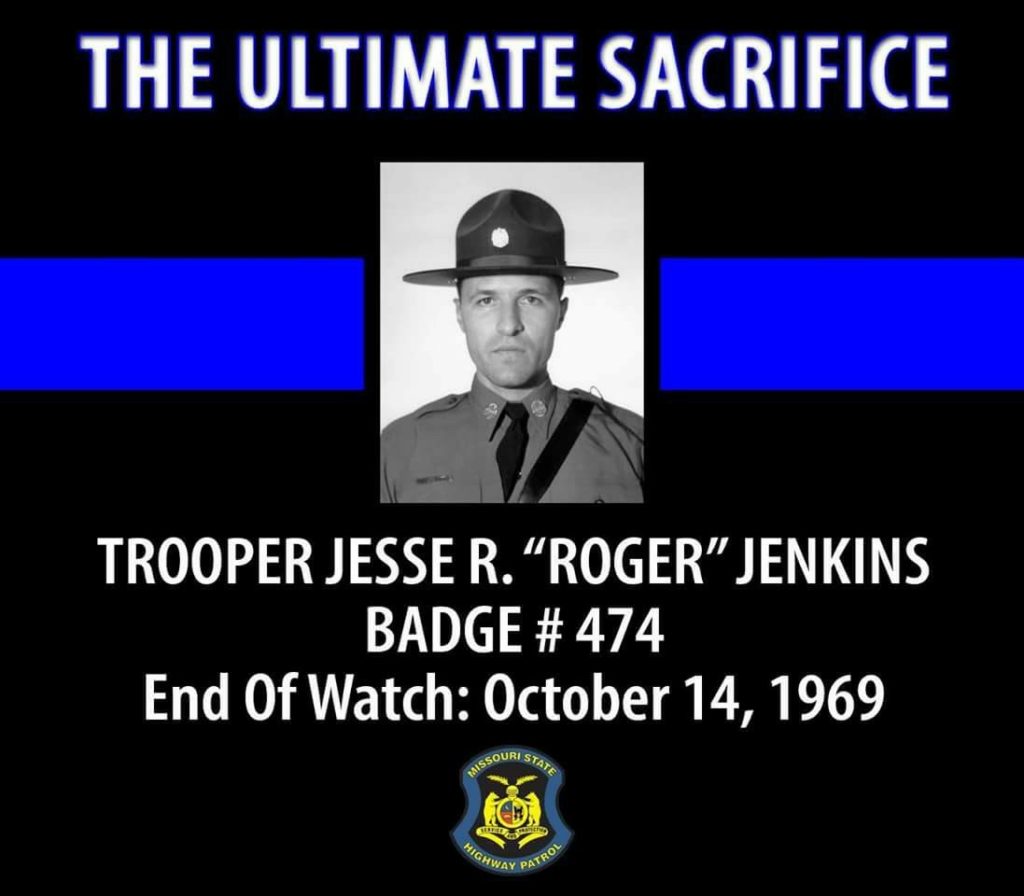
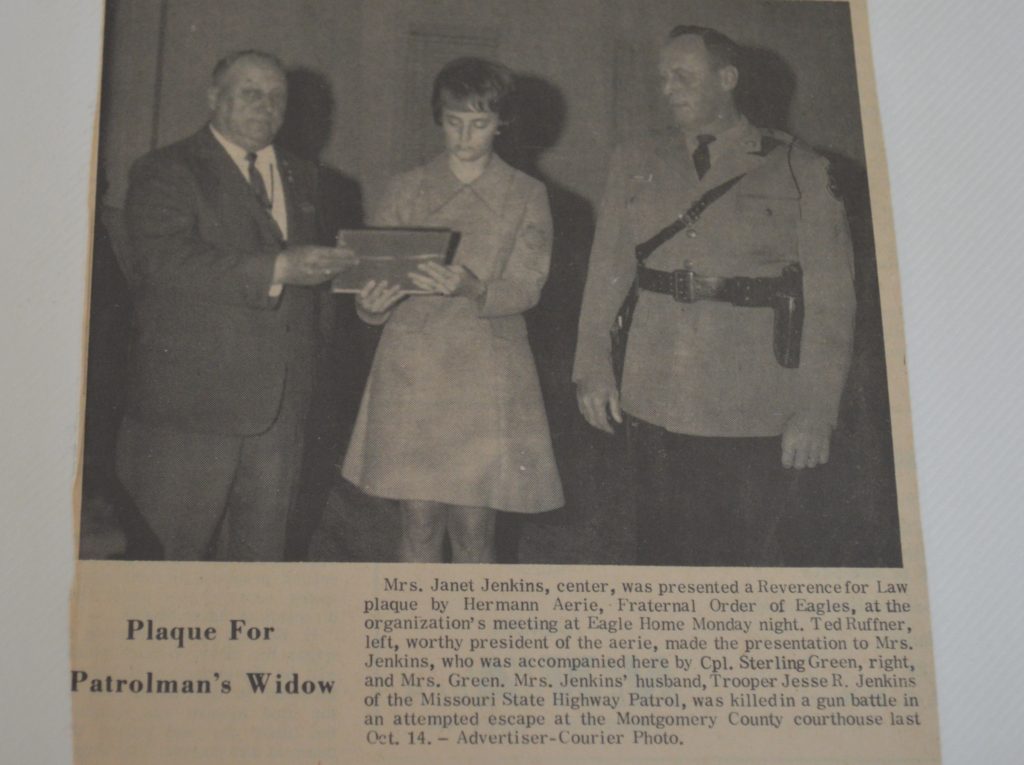
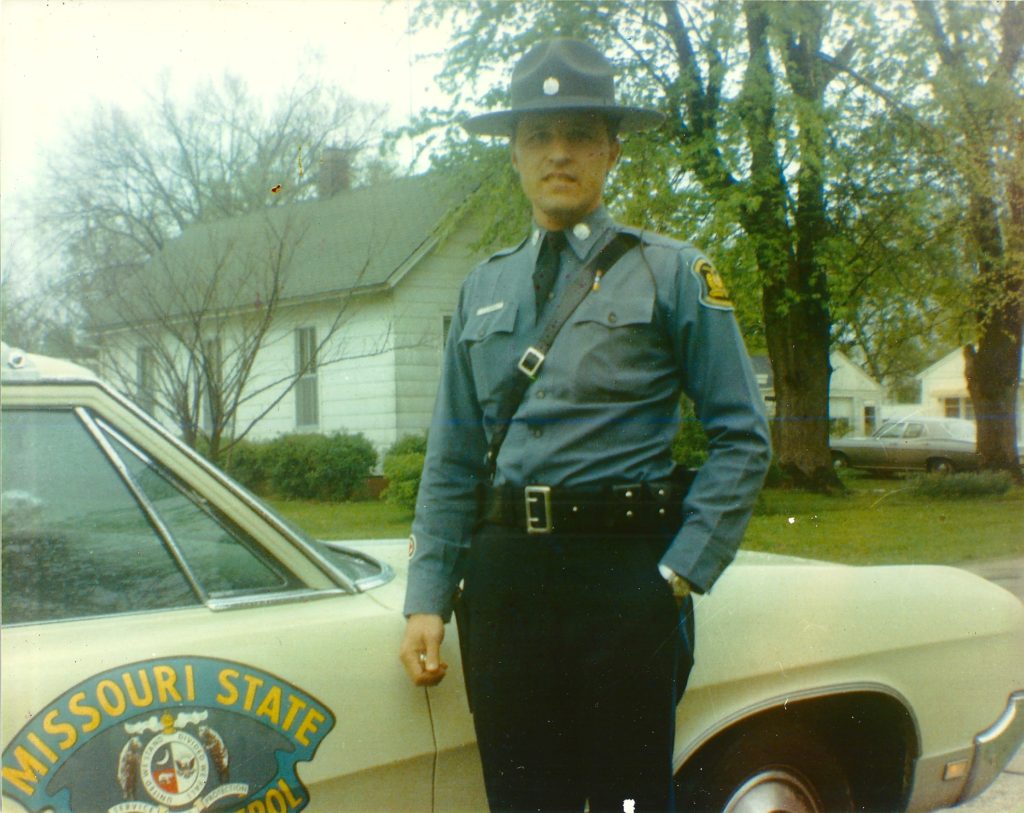
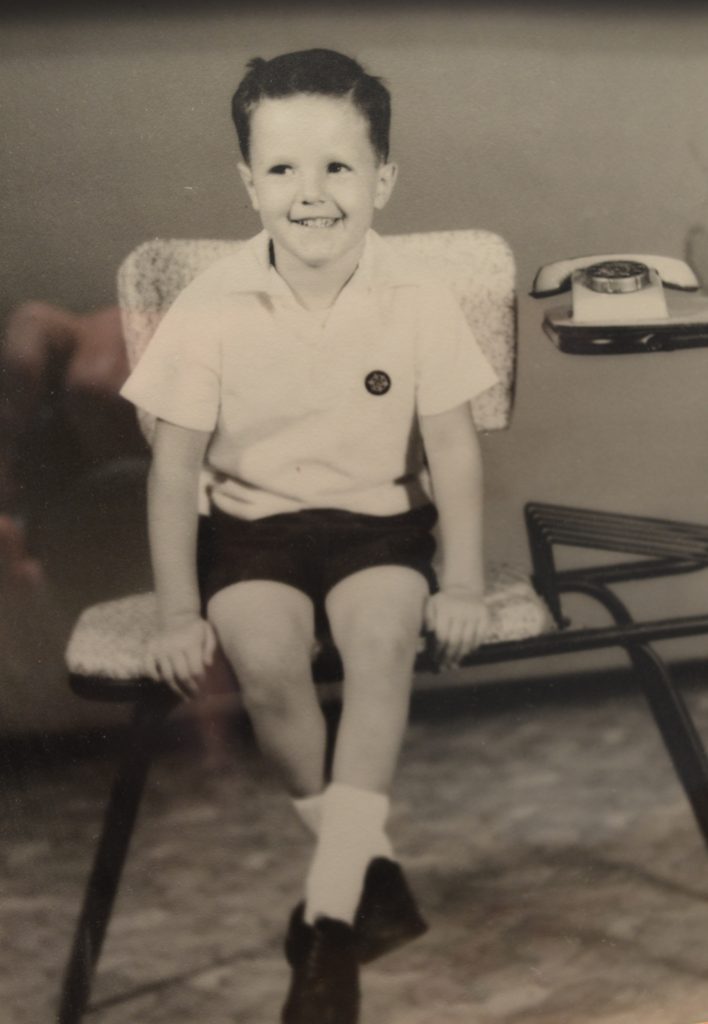
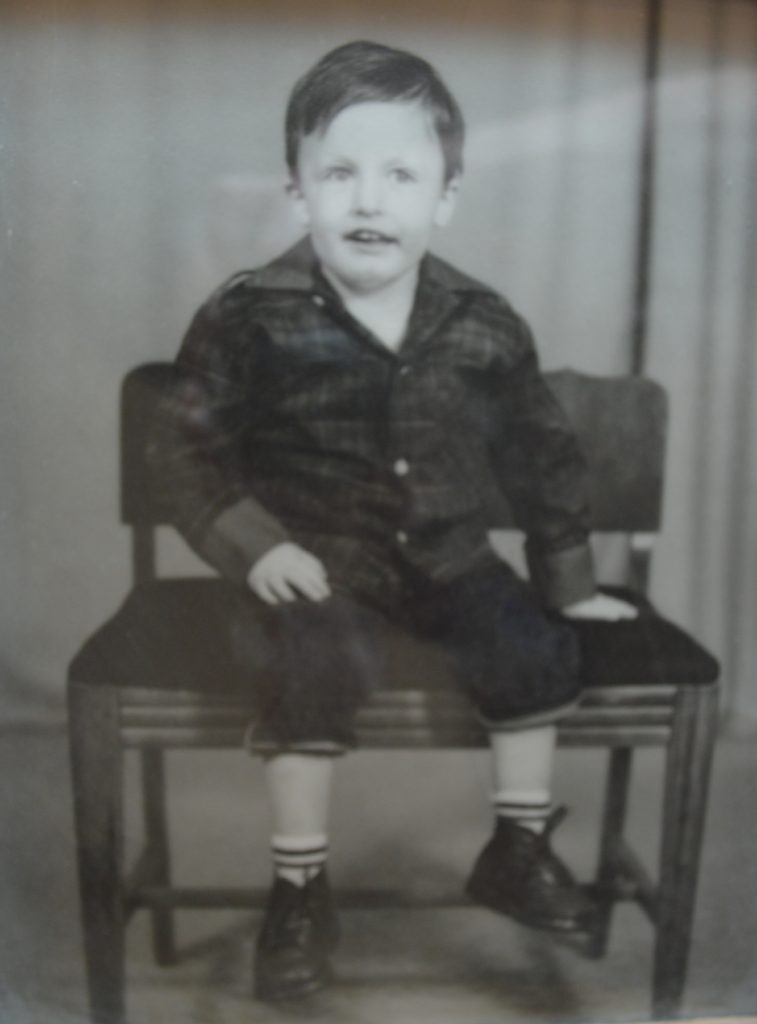
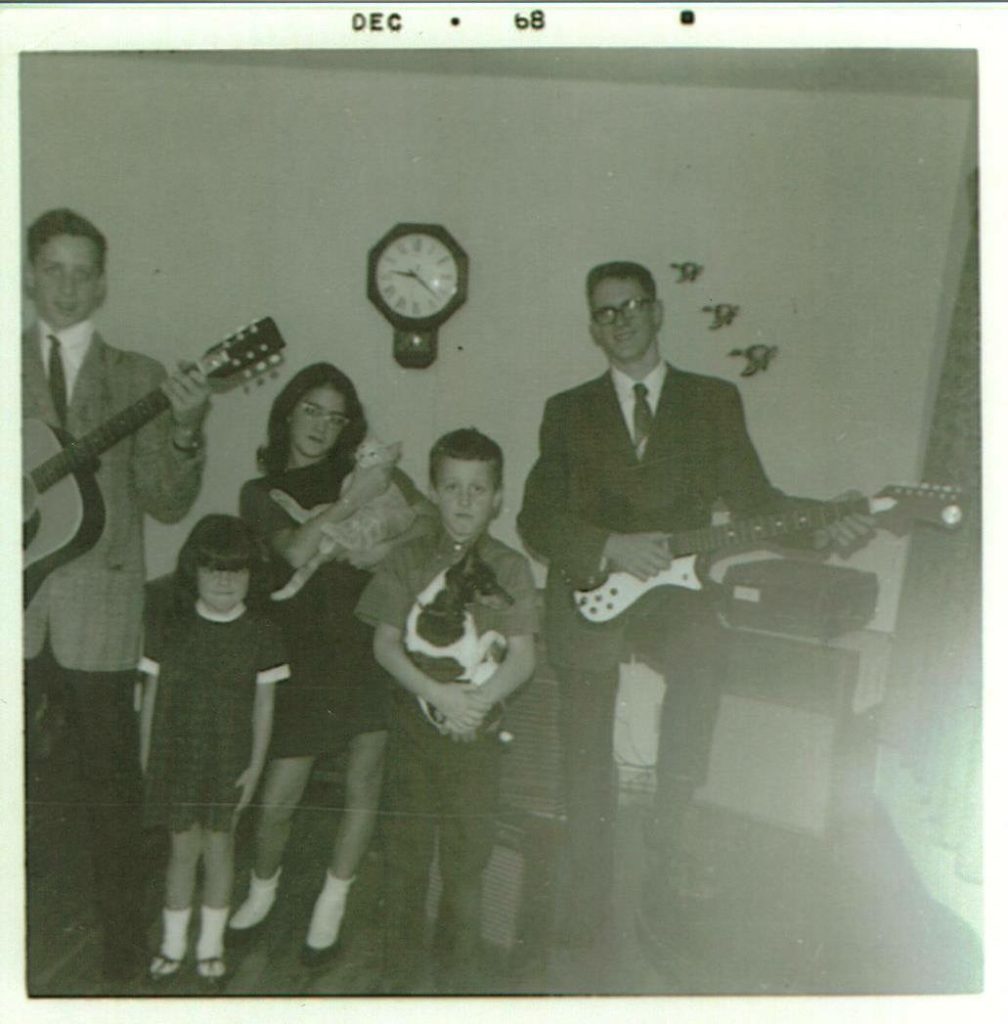
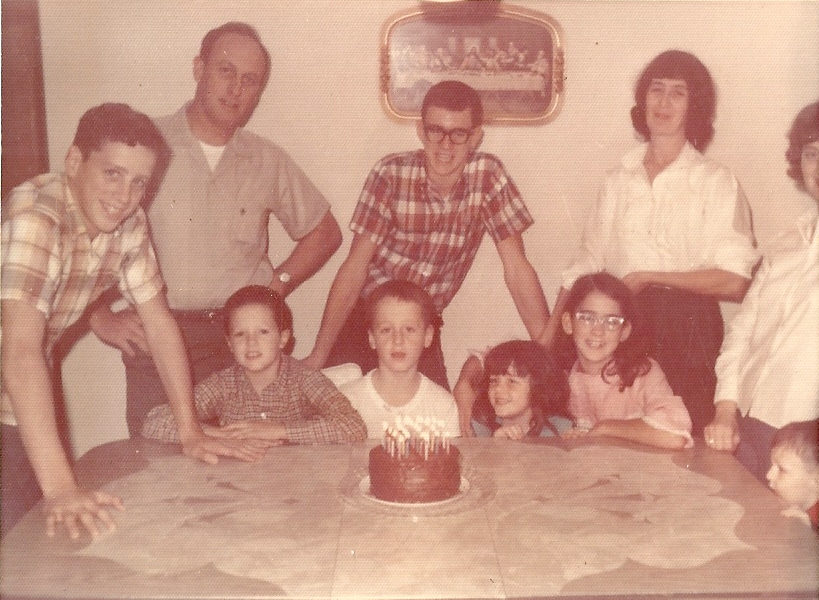
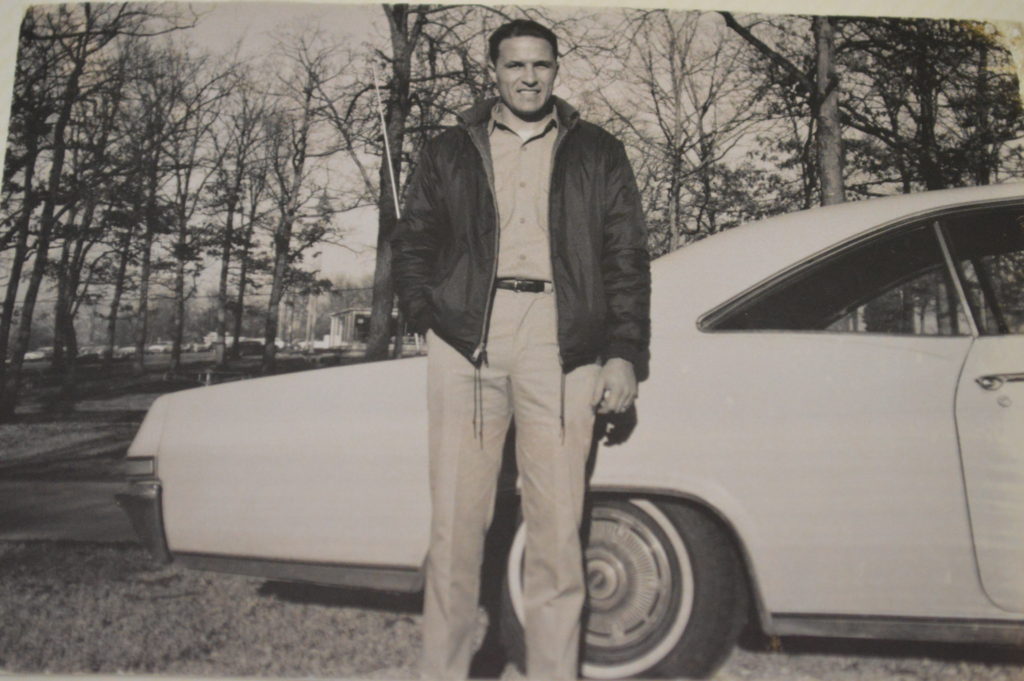
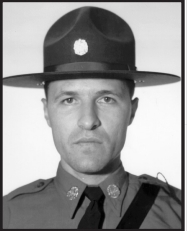
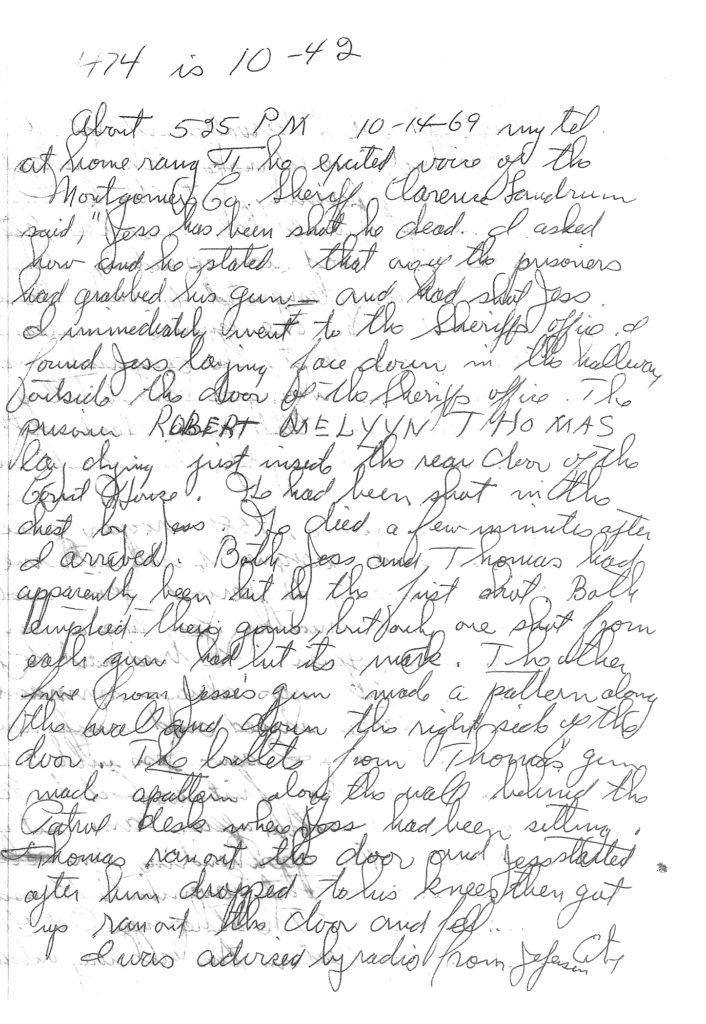
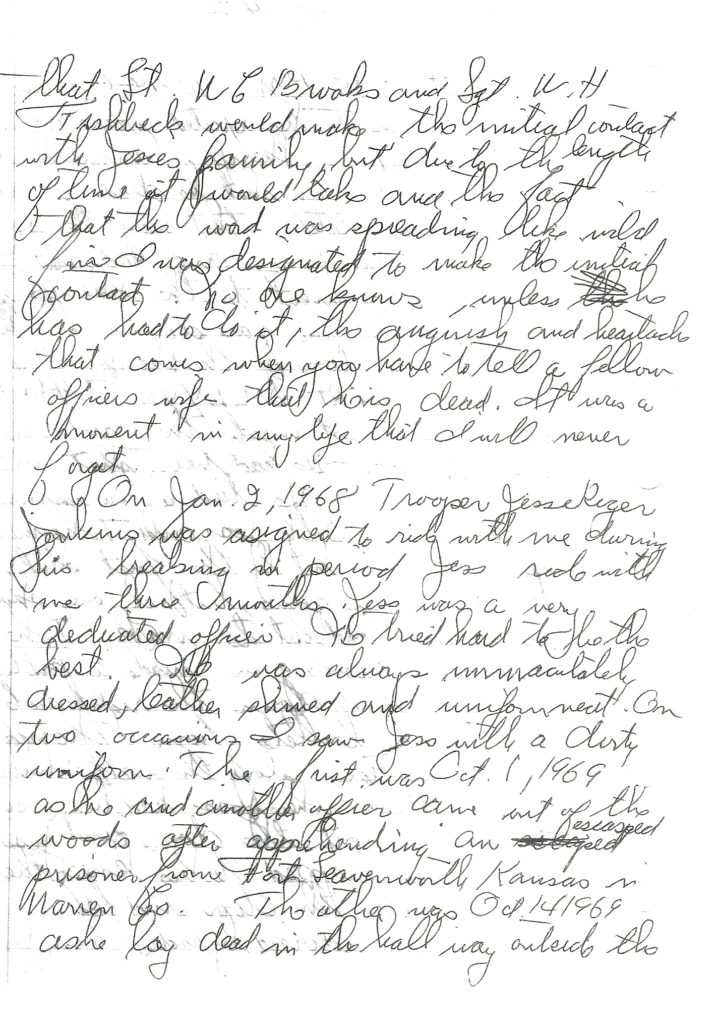
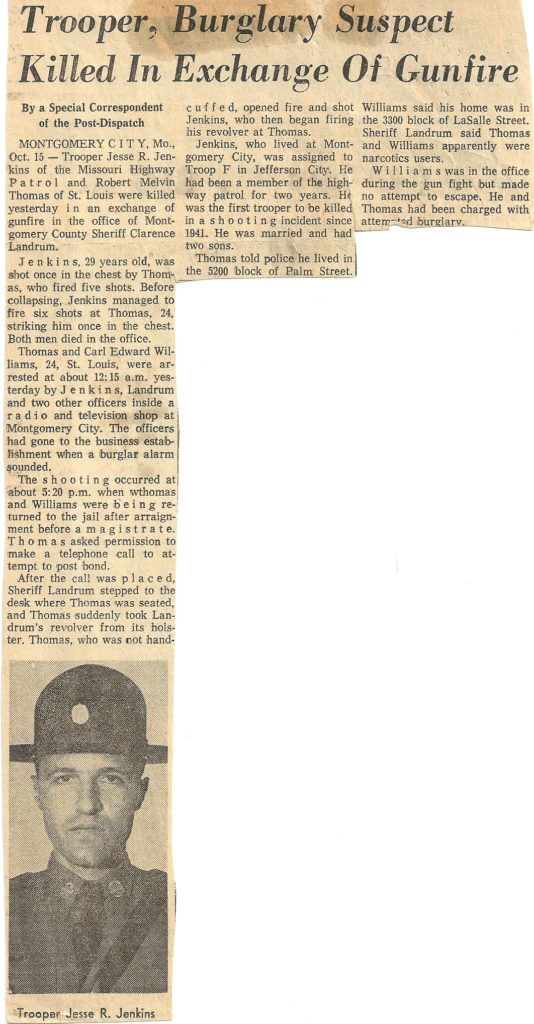
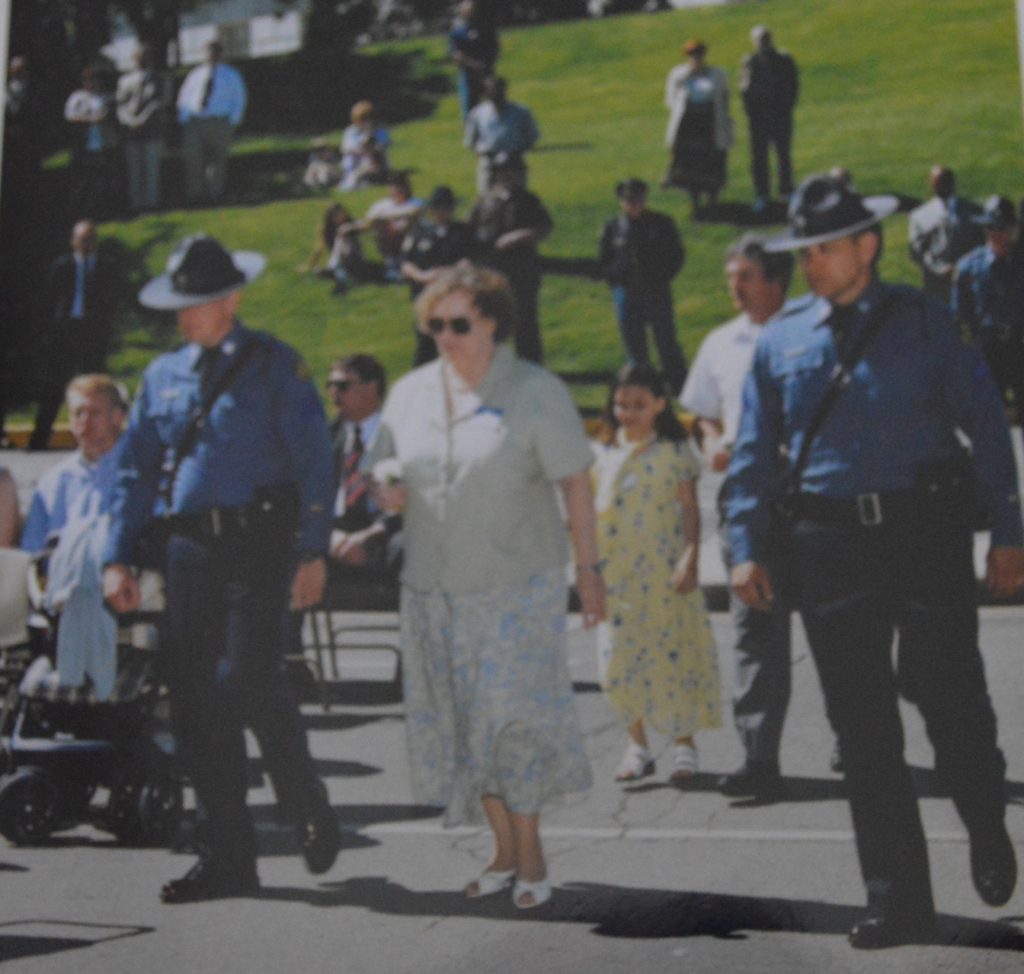
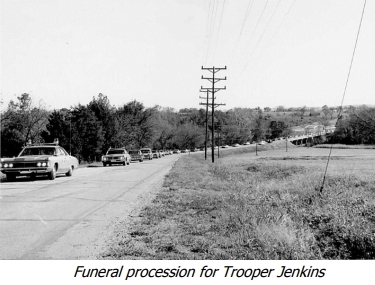
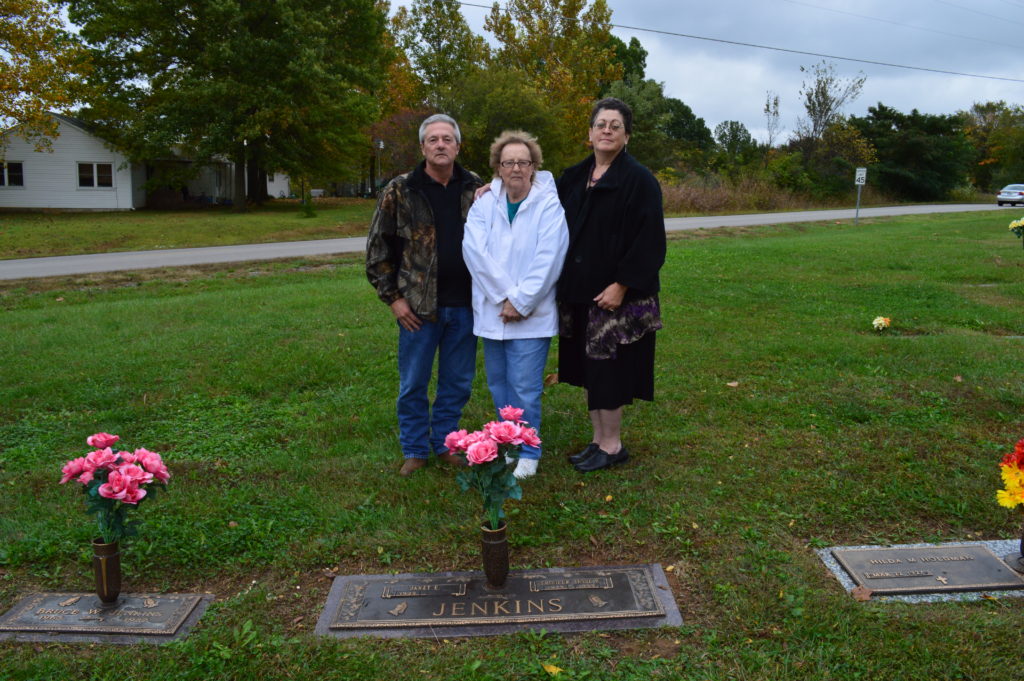
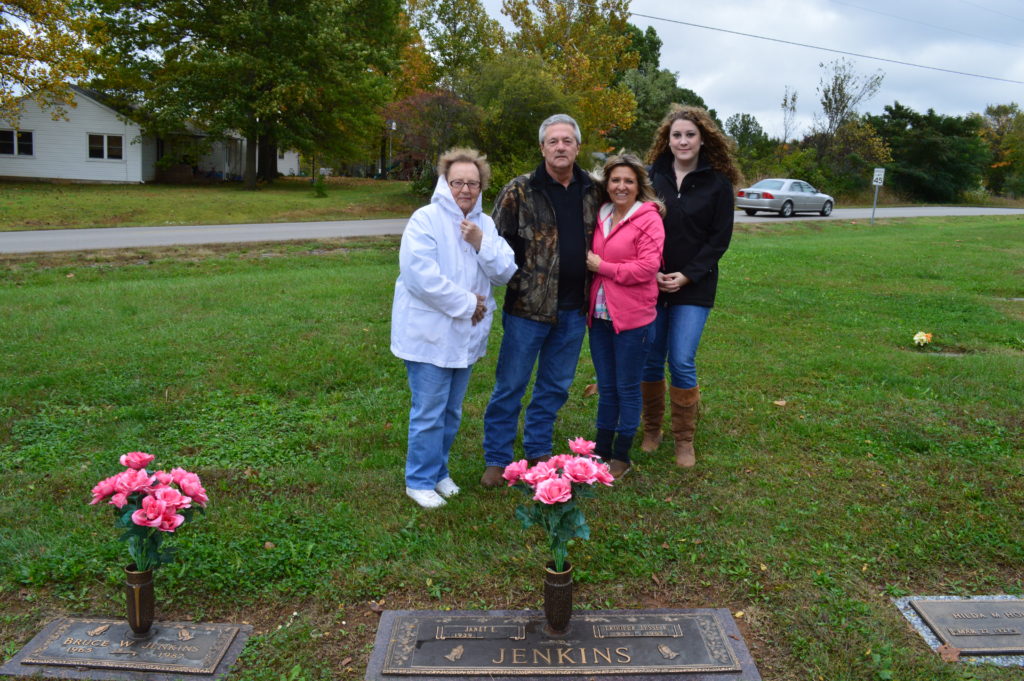
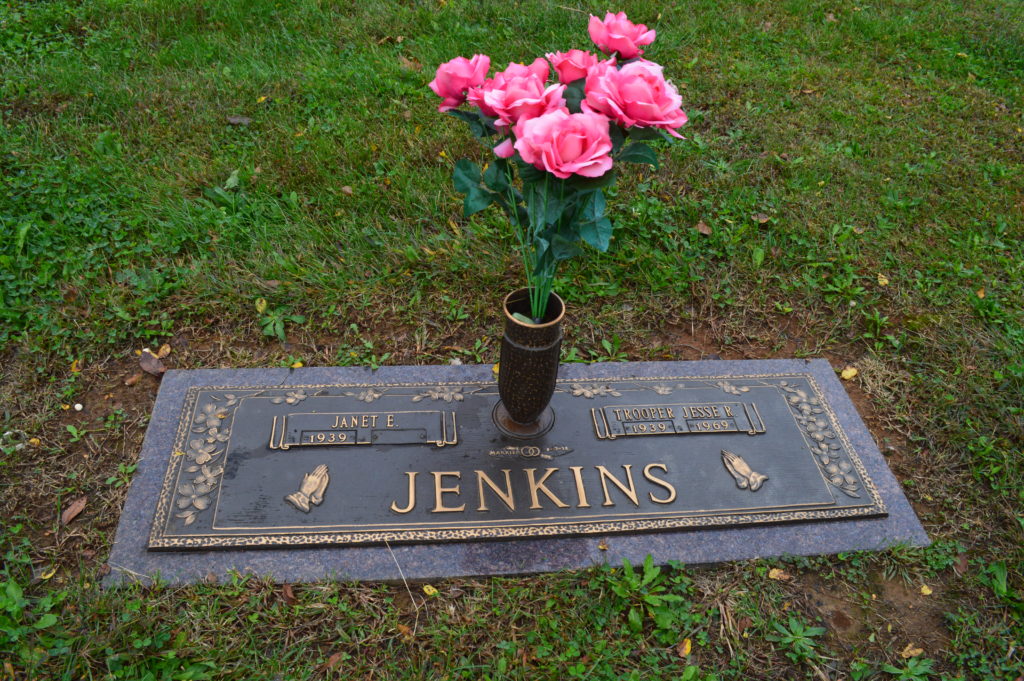
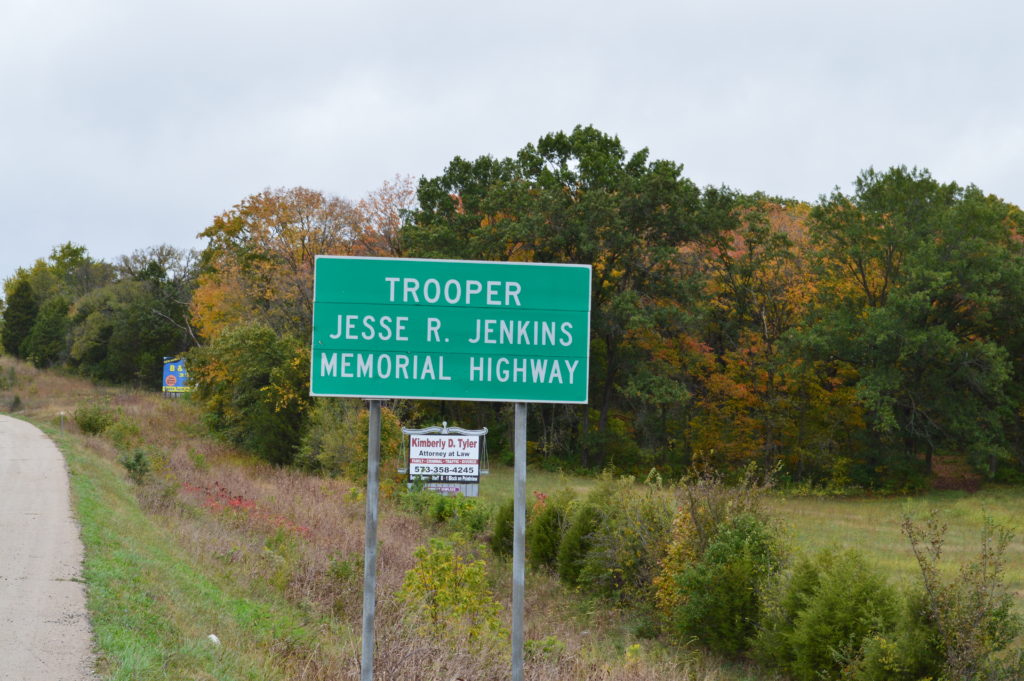
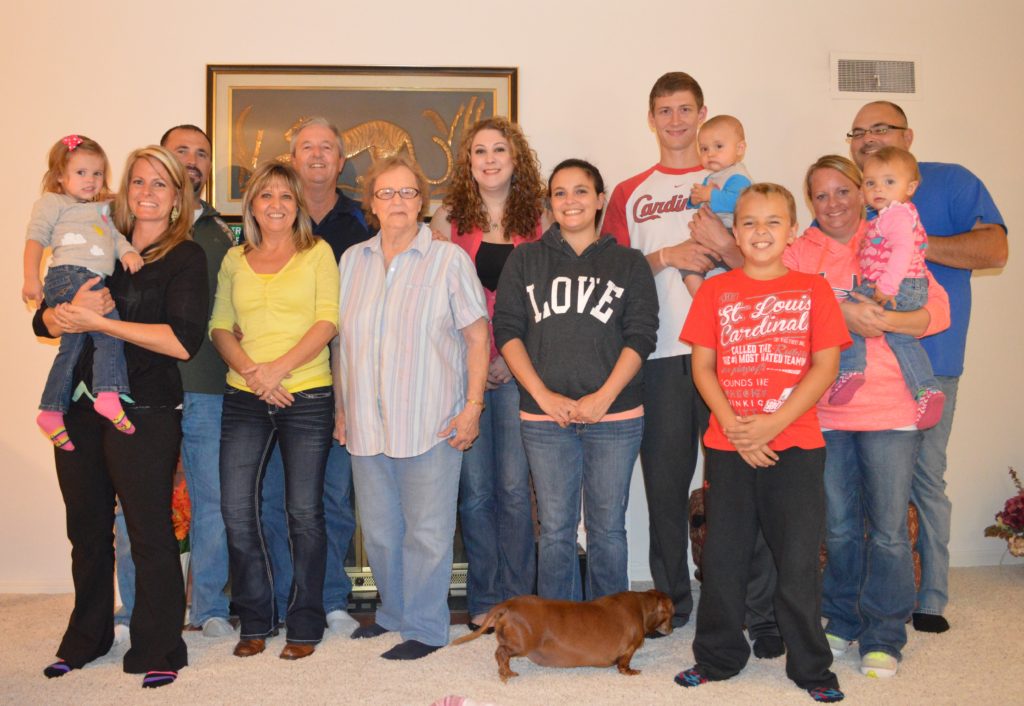
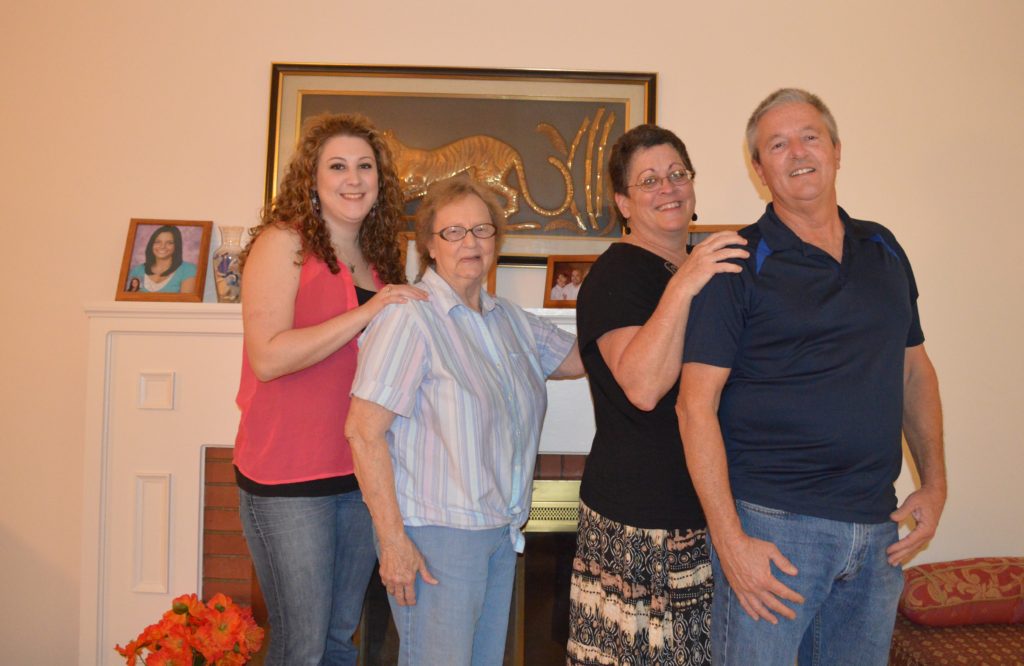
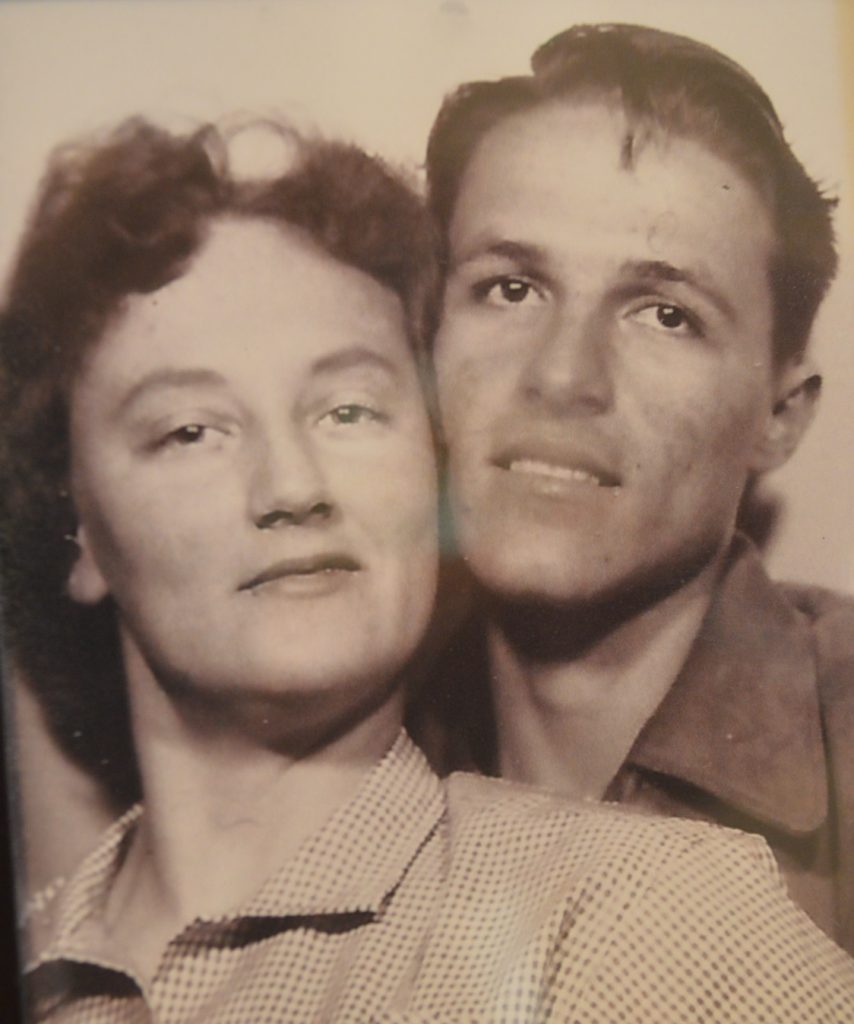
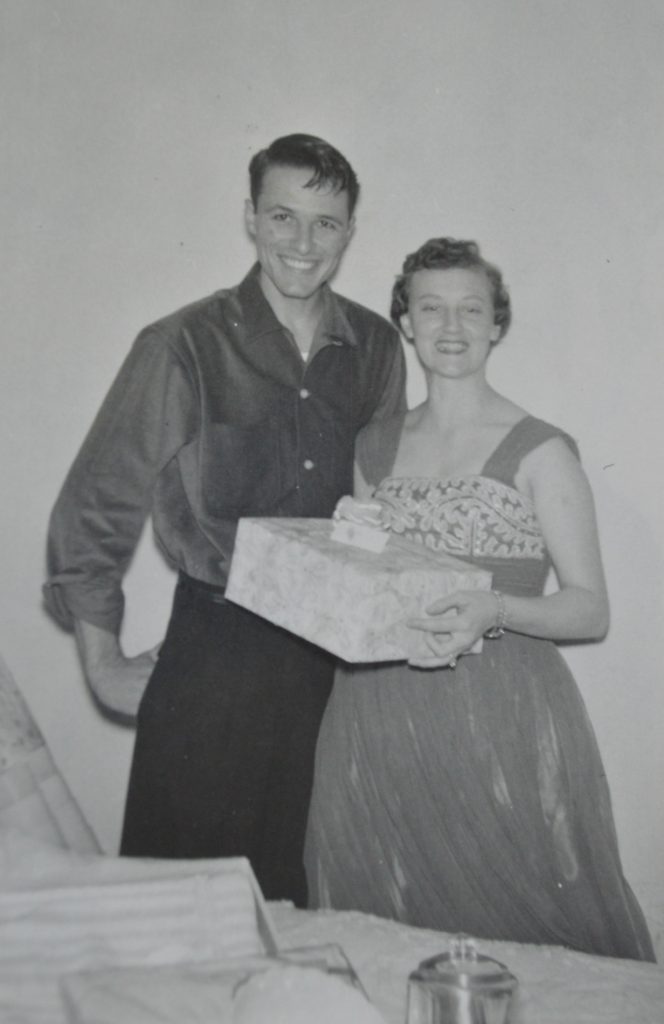

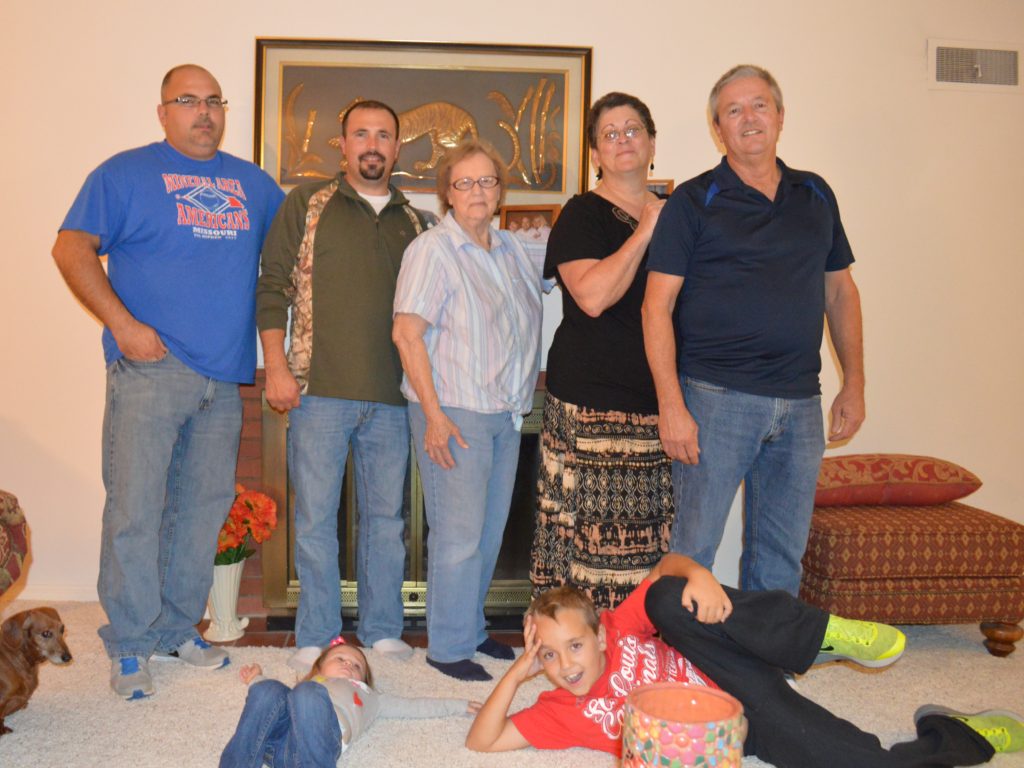
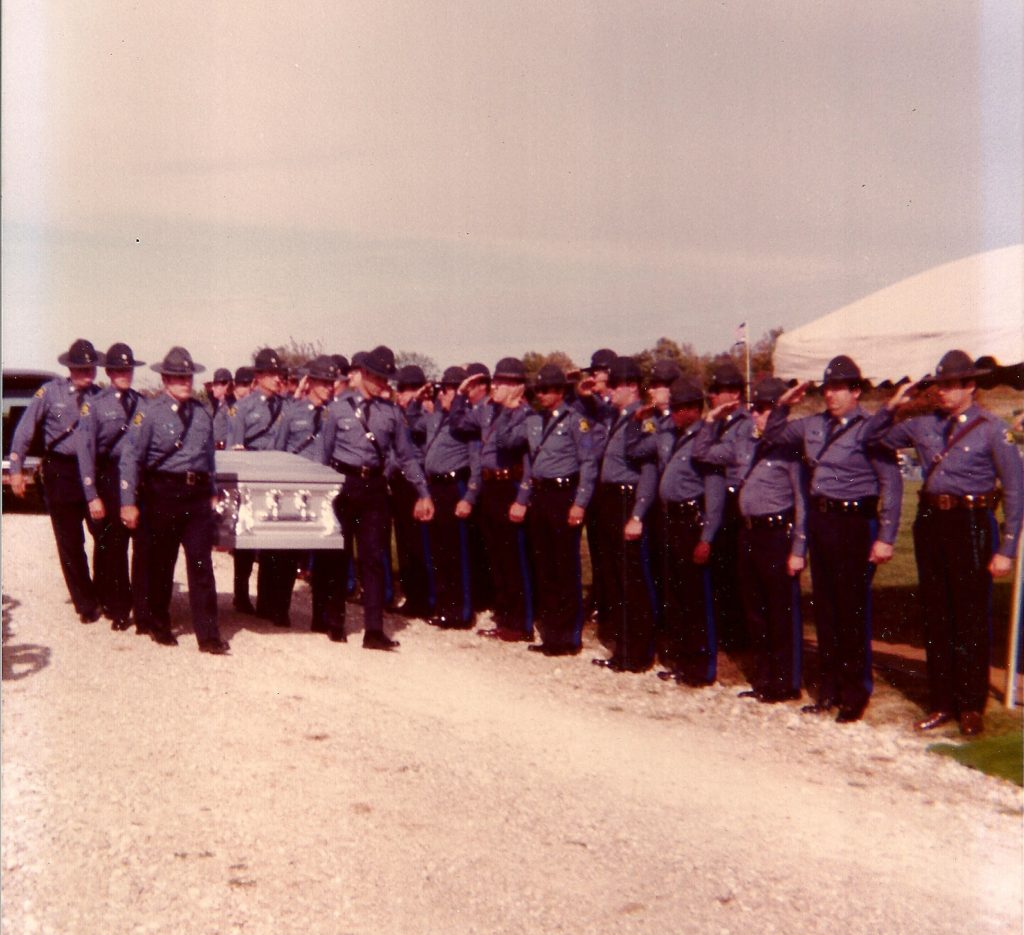
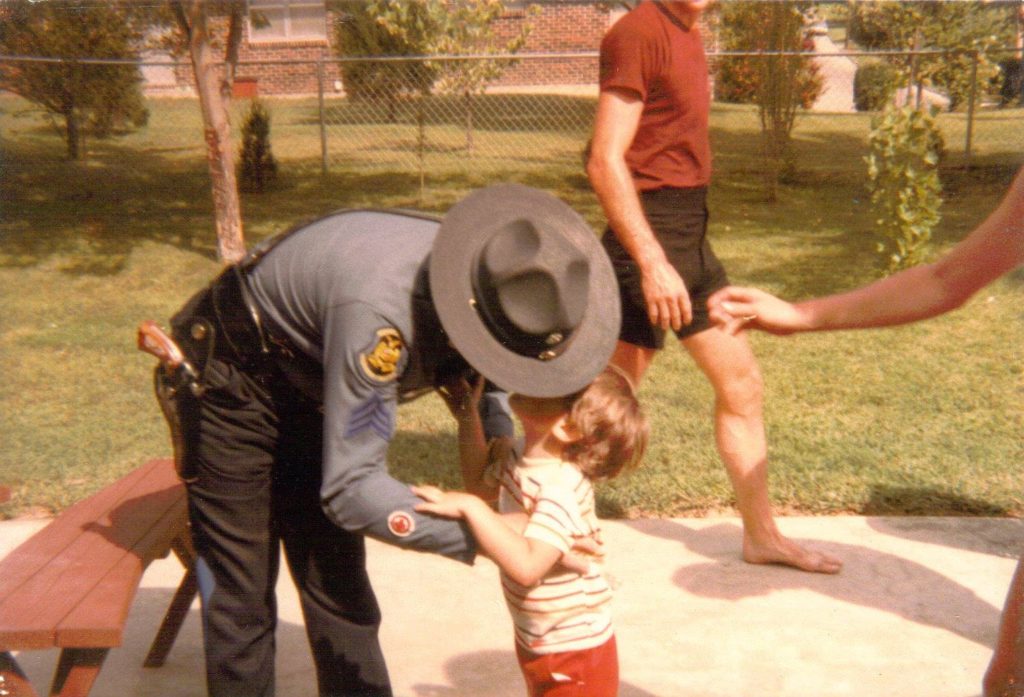
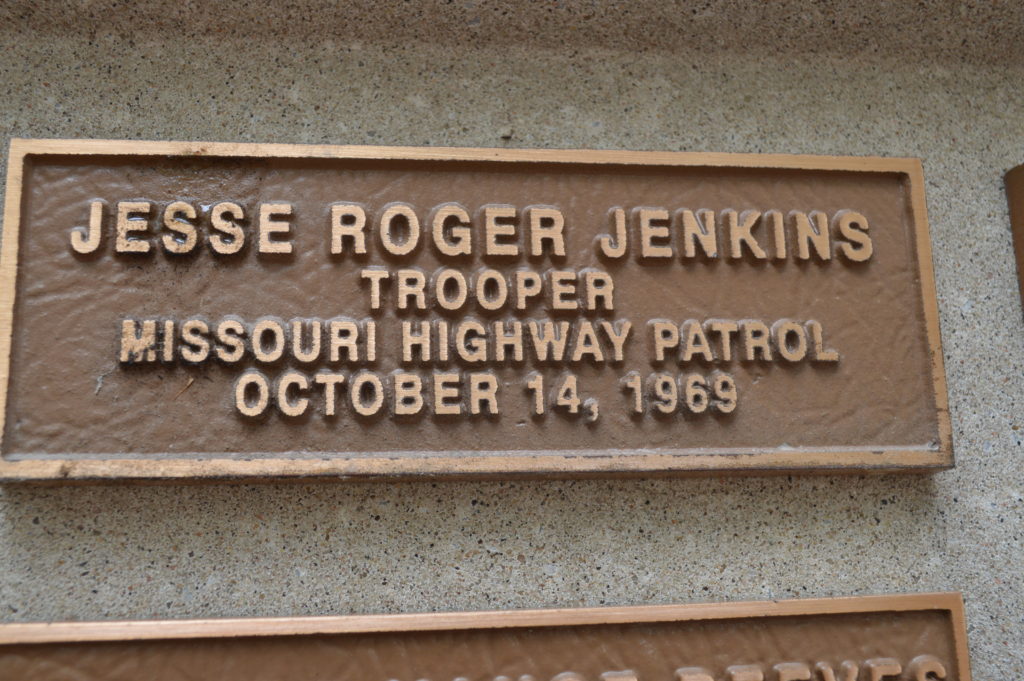
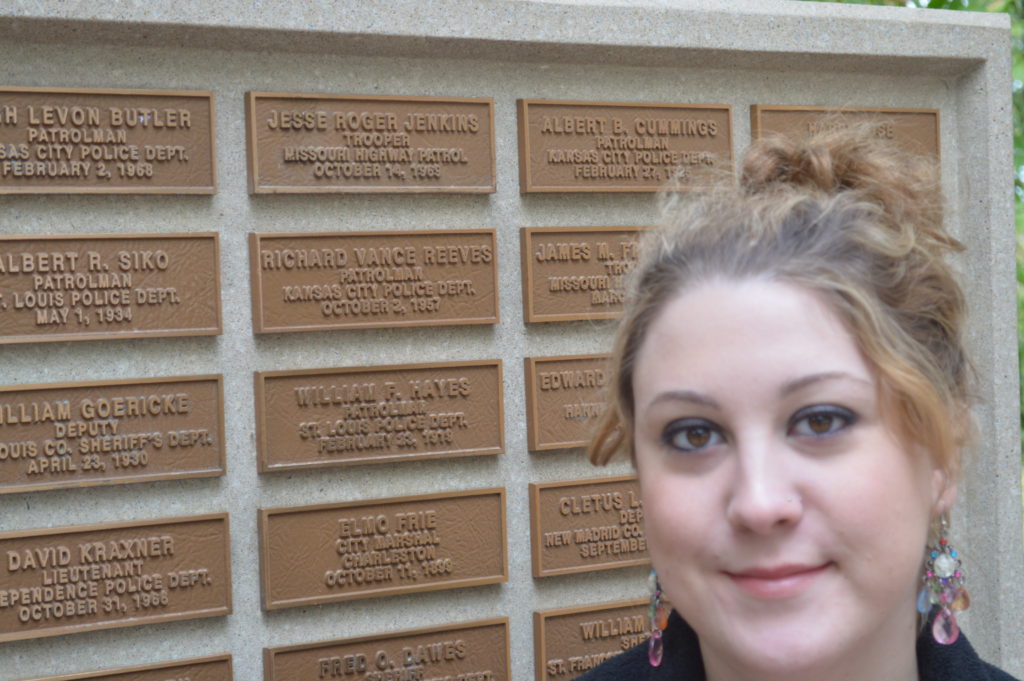
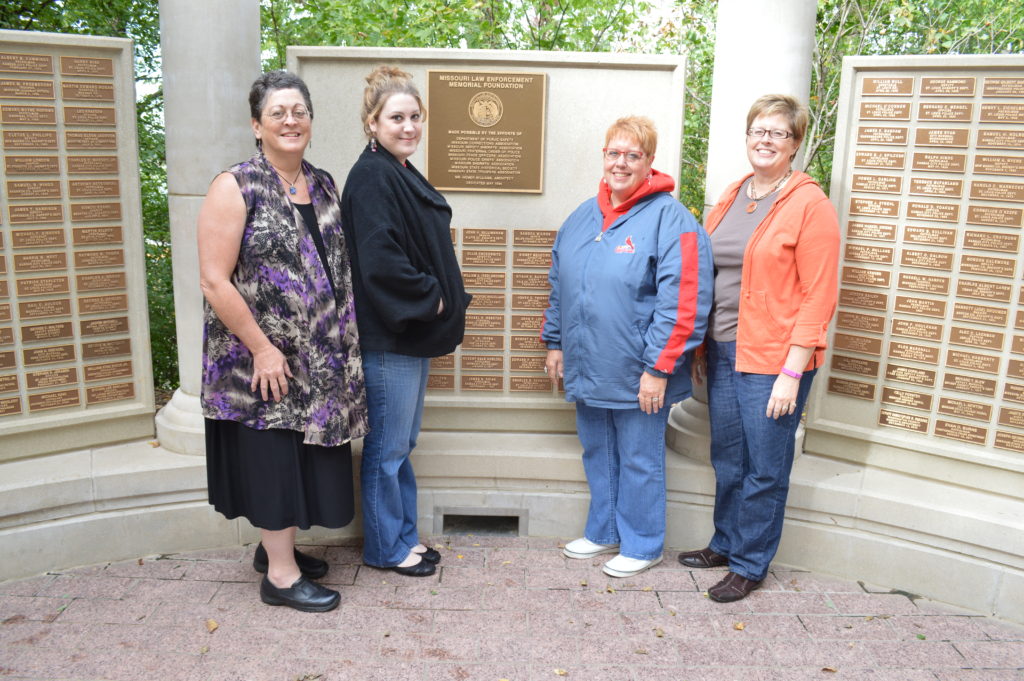
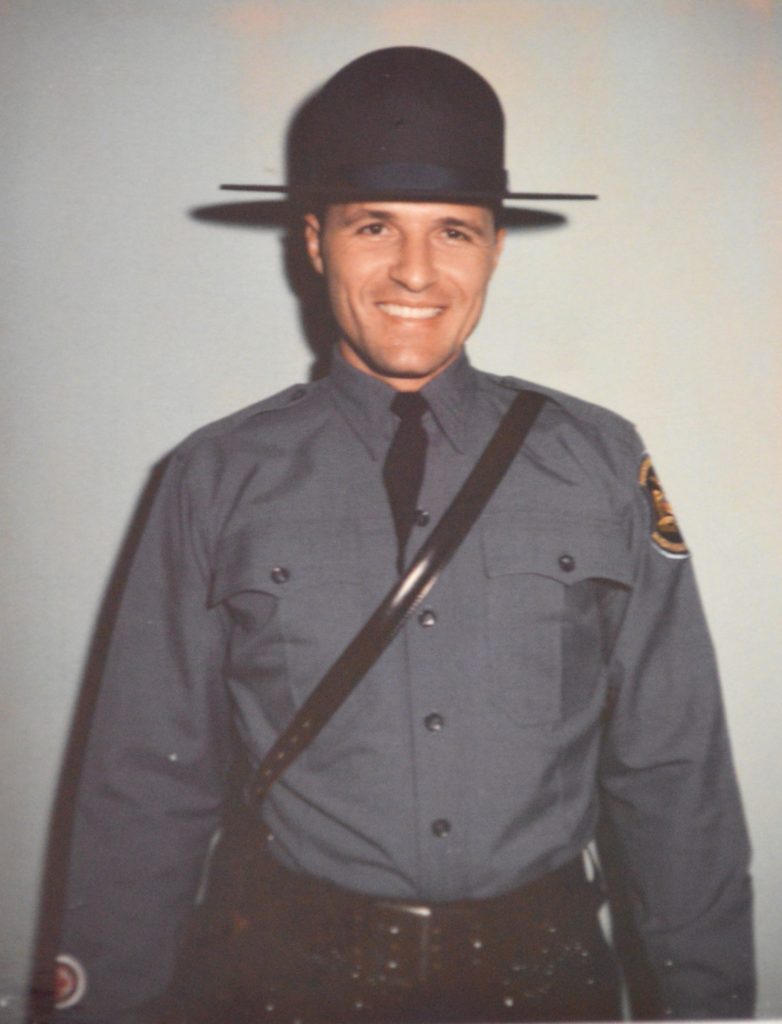
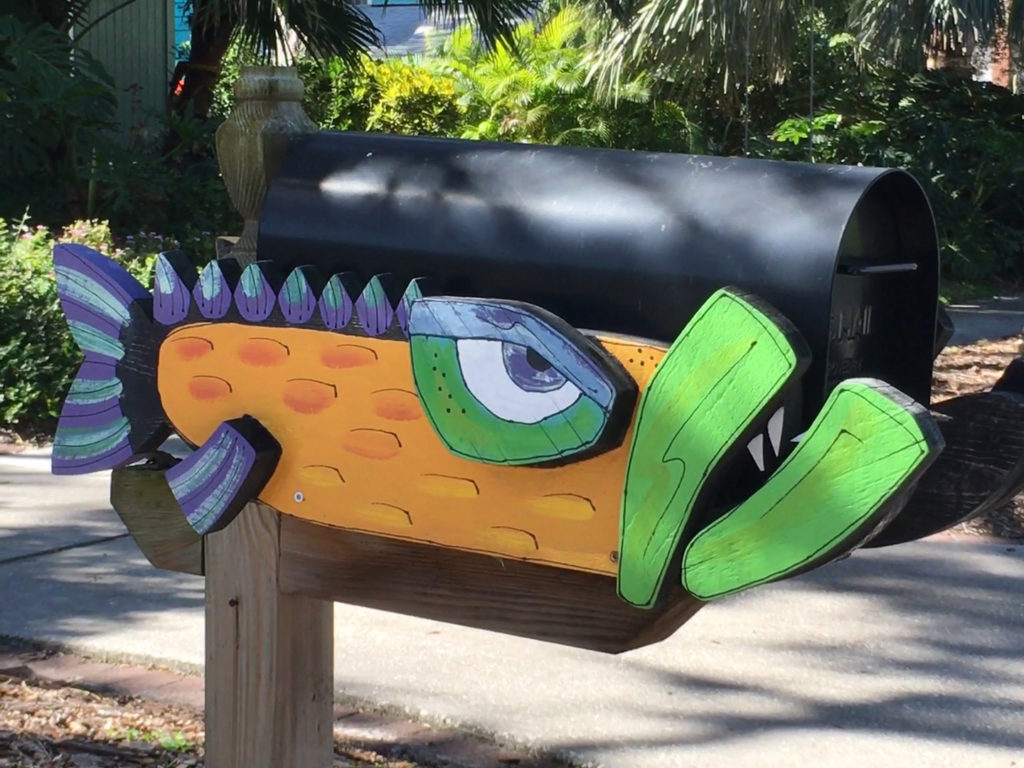
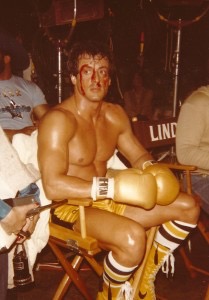
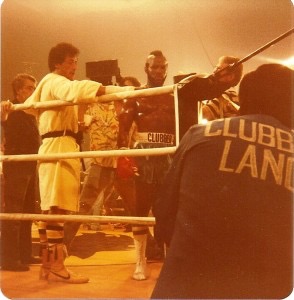
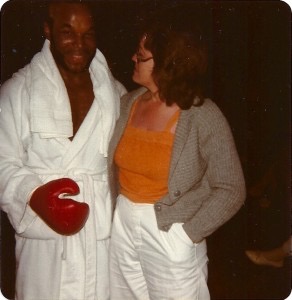
 When I returned back to my job as News Director of KHCC-FM in Hutchinson, KS after my vacation, the local newspaper there wrote a little feature article on my experience. I still feel a little guilty that the headline they came up with gives the impression I didn’t enjoy being an extra in the movie.
When I returned back to my job as News Director of KHCC-FM in Hutchinson, KS after my vacation, the local newspaper there wrote a little feature article on my experience. I still feel a little guilty that the headline they came up with gives the impression I didn’t enjoy being an extra in the movie.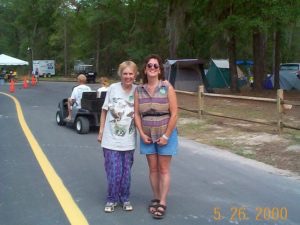 How can one summarize a 33 year friendship? It’s nearly impossible…but in this personal blog I wanted to share the personal memories I shared at Margaret Longhill’s funeral service held today in Citrus Springs at the St. Elizabeth Ann Seton Catholic Church. Every one there had their own special memories of this special lady, these are just some of mine.
How can one summarize a 33 year friendship? It’s nearly impossible…but in this personal blog I wanted to share the personal memories I shared at Margaret Longhill’s funeral service held today in Citrus Springs at the St. Elizabeth Ann Seton Catholic Church. Every one there had their own special memories of this special lady, these are just some of mine.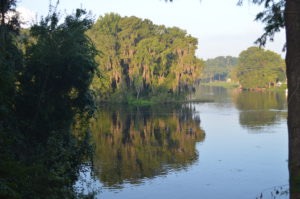
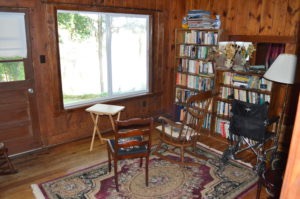 When I was sad and called Margaret on the phone to share something I was going through she would say, “You just pack your overnight bag and come over.” She’d have chicken soup waiting and a glass of wine and listen. We’d sit in the river room and look out over the Withlacoochee and Rainbow Rivers and talk, sometimes for hours. It was the best medicine.
When I was sad and called Margaret on the phone to share something I was going through she would say, “You just pack your overnight bag and come over.” She’d have chicken soup waiting and a glass of wine and listen. We’d sit in the river room and look out over the Withlacoochee and Rainbow Rivers and talk, sometimes for hours. It was the best medicine.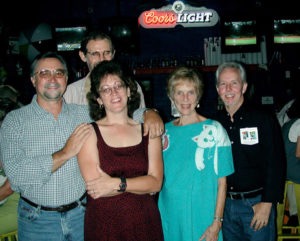 We squirreled ourselves into the little apartment where John and DeeDee Semmes live now…away from phone distractions and she listened to every word uninterrupted. When the documentary won a National Edward R. Murrow Award, Margaret and Mem Semmes traveled to Gainesville to join in the celebration. She then gave the musicians stage time at the Will McLean Festival to sing their Florida songs, songs inspired by Will McLean’s desire to “Save Florida Through Music.”
We squirreled ourselves into the little apartment where John and DeeDee Semmes live now…away from phone distractions and she listened to every word uninterrupted. When the documentary won a National Edward R. Murrow Award, Margaret and Mem Semmes traveled to Gainesville to join in the celebration. She then gave the musicians stage time at the Will McLean Festival to sing their Florida songs, songs inspired by Will McLean’s desire to “Save Florida Through Music.”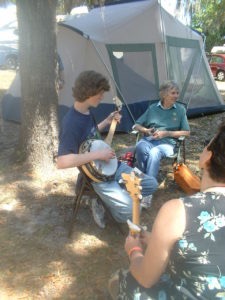 When my son Lee came along it was Margaret, Mem and Jon who encouraged him in his love for music and helped him purchase his first guitar. Lee is now 24 and performing at the Will McLean Festival as so many other young people are with Margaret’s loving encouragement and direction.
When my son Lee came along it was Margaret, Mem and Jon who encouraged him in his love for music and helped him purchase his first guitar. Lee is now 24 and performing at the Will McLean Festival as so many other young people are with Margaret’s loving encouragement and direction.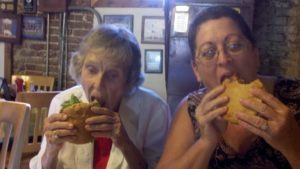 Later at the age of 90 Margaret drove herself to Alachua to celebrate Lee’s 18th birthday at Conestogas Restaurant and consumed giant stogie burgers with the rest of us.
Later at the age of 90 Margaret drove herself to Alachua to celebrate Lee’s 18th birthday at Conestogas Restaurant and consumed giant stogie burgers with the rest of us.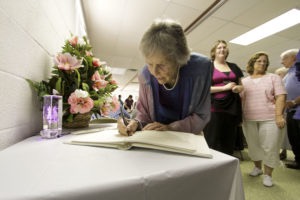
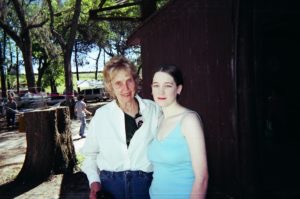 She attended my daughter Ellie’s wedding and celebrated the birth of Ellie’s first child with a stuffed musical lamb that now soothes my granddaughter to sleep at night.
She attended my daughter Ellie’s wedding and celebrated the birth of Ellie’s first child with a stuffed musical lamb that now soothes my granddaughter to sleep at night.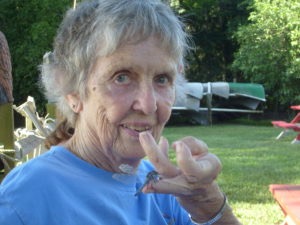 While in Cross Creek In July of 2010, we spent time at the Twin Lakes Fish Camp looking out over Lochloosa Lake and a beautiful dragonfly befriended us. In a true dragonfly encounter we spent at least a half hour passing the beautiful creature back and forth from my finger to hers and my friend Priscilla Hall.
While in Cross Creek In July of 2010, we spent time at the Twin Lakes Fish Camp looking out over Lochloosa Lake and a beautiful dragonfly befriended us. In a true dragonfly encounter we spent at least a half hour passing the beautiful creature back and forth from my finger to hers and my friend Priscilla Hall.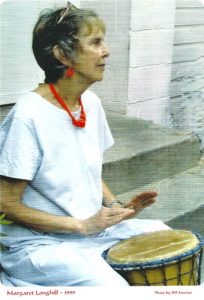
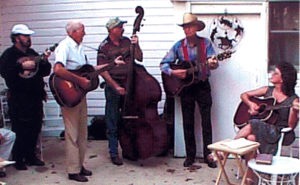
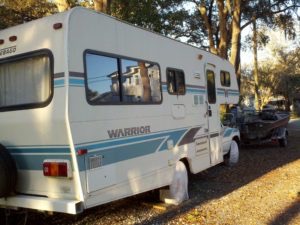 Through many Will McLean Music Festivals and Florida Folk Festivals she allowed me to plug an extension cord into her RV, just as Will McLean did when he’d travel around to see his friends, allowing us both to have a fan and a light.
Through many Will McLean Music Festivals and Florida Folk Festivals she allowed me to plug an extension cord into her RV, just as Will McLean did when he’d travel around to see his friends, allowing us both to have a fan and a light.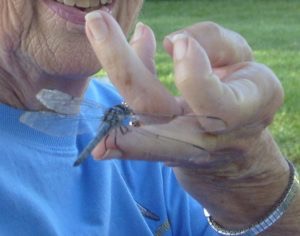 As you can see in this picture (and as mentioned above), once while sitting at the Twin Lakes Fish Camp in Cross Creek overlooking Lochloosa Lake, a blue dragonfly landed on her hand. For the next half-hour Margaret passed the dragonfly from her finger to me and friend Priscilla Hall. So it seemed so special that one would land on my microphone during Amazing Grace. Many people call dragonflies “skeeter hawks.” I like to think of Margaret as a “Skeeter Hawk” now flying with her dear friend Will McLean who always said his soul was a hawk. Now they’re both “somewhere in the wind.”
As you can see in this picture (and as mentioned above), once while sitting at the Twin Lakes Fish Camp in Cross Creek overlooking Lochloosa Lake, a blue dragonfly landed on her hand. For the next half-hour Margaret passed the dragonfly from her finger to me and friend Priscilla Hall. So it seemed so special that one would land on my microphone during Amazing Grace. Many people call dragonflies “skeeter hawks.” I like to think of Margaret as a “Skeeter Hawk” now flying with her dear friend Will McLean who always said his soul was a hawk. Now they’re both “somewhere in the wind.”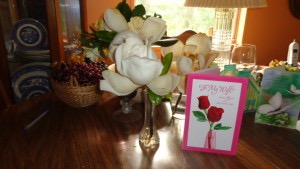 Editor’s note: I’m tickled to say that even though he didn’t use his rifle to shoot down this year’s magnolia blossom, my husband kept his Mother’s Day tradition alive this year (2017).
Editor’s note: I’m tickled to say that even though he didn’t use his rifle to shoot down this year’s magnolia blossom, my husband kept his Mother’s Day tradition alive this year (2017).
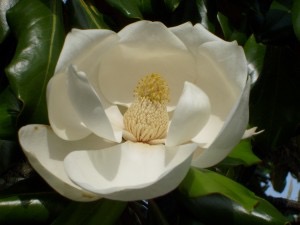
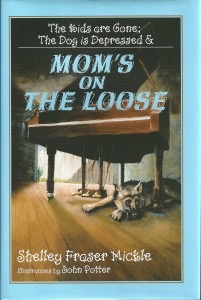
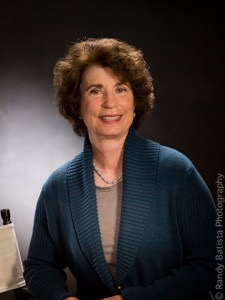
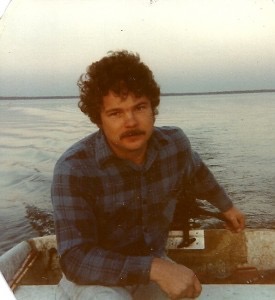
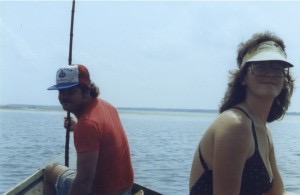
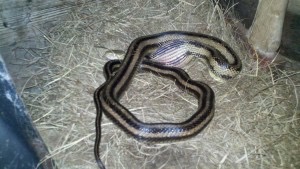
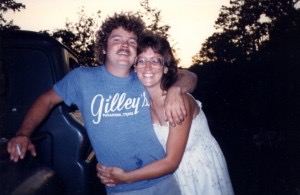
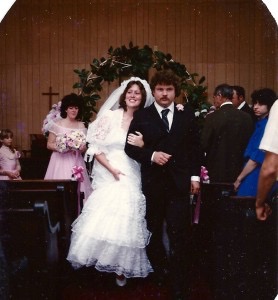
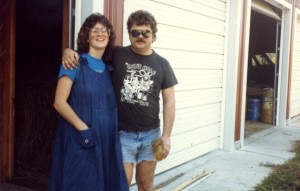
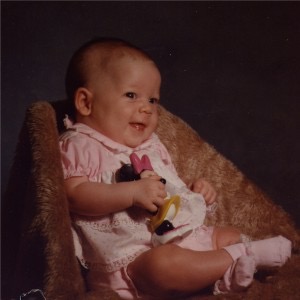
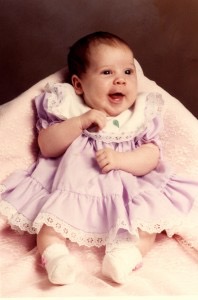
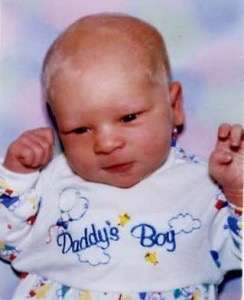
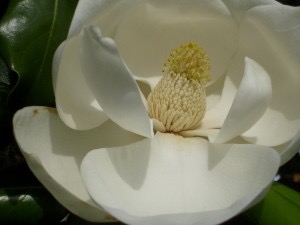
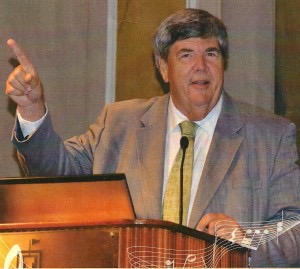
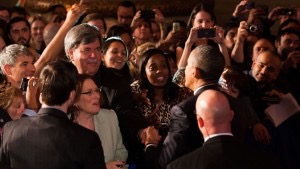
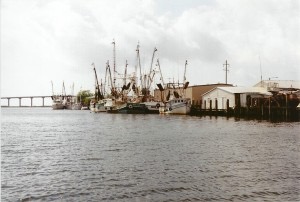
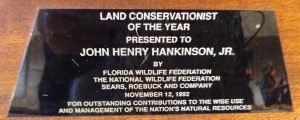
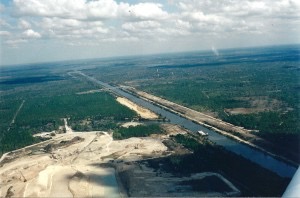
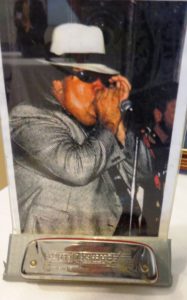 Hankinson loved playing music and was an avid blues harmonica player with several bands including the band known as Johnny Matanzas and the Hombres as well as the band called, The Non Essentials.
Hankinson loved playing music and was an avid blues harmonica player with several bands including the band known as Johnny Matanzas and the Hombres as well as the band called, The Non Essentials.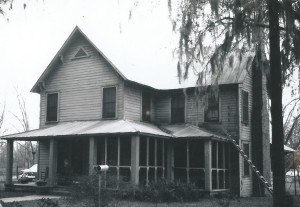
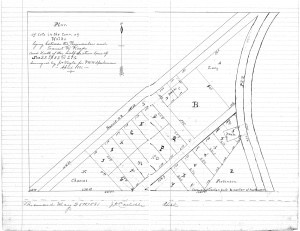 From 1881 to 1884, a section of lots R, S, T, and U in Sparkman’s Addition was owned by Mary Weeks, then Julia Blackstock, and later James Weeks. Our house is on lot U, which was not sold individually until James Weeks deeded it to Lula Seigler for $500 in 1894. He’d sold lots R, S, and T combined for the same price in 1890, which seems to suggest that a structure was already in existence on Lot U when Seigler purchased it. Conversely, her family would own the property for 47 years, a much longer period during which to create a home. Charles Womeldorf, who most recently owned the house, remembers a conversation he had with Lula Seigler’s daughter, Isla: she said she was a young girl when her father, William David Seigler, built the house. At the same time, he recollects seeing an old window on the second floor etched with the year “1870.” This raises the question of whether the house was constructed with materials taken from an older home, or whether the Seiglers simply added onto an existing building. At the very least, we are certain that the rear kitchen addition was built under their ownership, as old boards we exposed in the ceiling there were inscribed: “Mrs. L.D. Seagler, Waldo, Fla.”
From 1881 to 1884, a section of lots R, S, T, and U in Sparkman’s Addition was owned by Mary Weeks, then Julia Blackstock, and later James Weeks. Our house is on lot U, which was not sold individually until James Weeks deeded it to Lula Seigler for $500 in 1894. He’d sold lots R, S, and T combined for the same price in 1890, which seems to suggest that a structure was already in existence on Lot U when Seigler purchased it. Conversely, her family would own the property for 47 years, a much longer period during which to create a home. Charles Womeldorf, who most recently owned the house, remembers a conversation he had with Lula Seigler’s daughter, Isla: she said she was a young girl when her father, William David Seigler, built the house. At the same time, he recollects seeing an old window on the second floor etched with the year “1870.” This raises the question of whether the house was constructed with materials taken from an older home, or whether the Seiglers simply added onto an existing building. At the very least, we are certain that the rear kitchen addition was built under their ownership, as old boards we exposed in the ceiling there were inscribed: “Mrs. L.D. Seagler, Waldo, Fla.”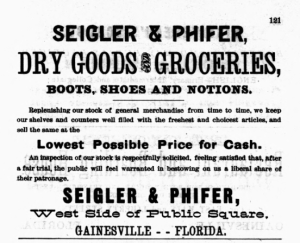 William, or W.D., was born in 1857 in Florida, his family being settled in Putnam County by 1860. His parents, Marshal Seigler and Permelia Ellen Johnson, hailed from South Carolina. Marshal, who would later become a co-founder of the Etoniah Canal and Drainage Company, began his career as a general merchant in Waldo. His business was called Seigler & Johnson, his partner likely his brother-in-law. He notably employed William Baxter Phifer, who later opened his own store in Waldo with Marshal’s son, W.D. In 1882, the young merchants sold that business and opened Seigler & Phifer in Gainesville. Their ad appeared in the 1883 publication, The Eden of the South. At the end of that year, they closed their Gainesville store and began a new venture in Rochelle. How long they remained partners is unclear. Phifer eventually went into business with his brothers, and together they opened the Phifer State Bank.
William, or W.D., was born in 1857 in Florida, his family being settled in Putnam County by 1860. His parents, Marshal Seigler and Permelia Ellen Johnson, hailed from South Carolina. Marshal, who would later become a co-founder of the Etoniah Canal and Drainage Company, began his career as a general merchant in Waldo. His business was called Seigler & Johnson, his partner likely his brother-in-law. He notably employed William Baxter Phifer, who later opened his own store in Waldo with Marshal’s son, W.D. In 1882, the young merchants sold that business and opened Seigler & Phifer in Gainesville. Their ad appeared in the 1883 publication, The Eden of the South. At the end of that year, they closed their Gainesville store and began a new venture in Rochelle. How long they remained partners is unclear. Phifer eventually went into business with his brothers, and together they opened the Phifer State Bank.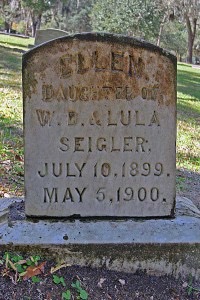
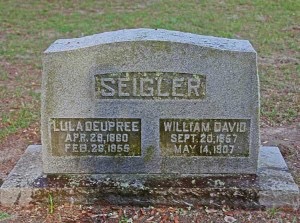 Isla and Lula moved to Gainesville following the Agreement in 1941, and lived in a house on University Avenue across from the Kirby Smith building. Just as her husband’s death made headlines in 1907, news of Lula Seigler’s passing in 1955 appeared on the front page of the Gainesville Sun: “Mrs. Seigler, 94, Taken by Death.” Isla Kinzer moved to Tampa a few years after her mother’s death, and passed away there in 1975. All of the Seiglers and Kinzers, with the exception of Harry and his descendants, are buried in Evergreen Cemetery in Gainesville; Harry and his first wife are interred at Laurel Grove Cemetery in Waldo.
Isla and Lula moved to Gainesville following the Agreement in 1941, and lived in a house on University Avenue across from the Kirby Smith building. Just as her husband’s death made headlines in 1907, news of Lula Seigler’s passing in 1955 appeared on the front page of the Gainesville Sun: “Mrs. Seigler, 94, Taken by Death.” Isla Kinzer moved to Tampa a few years after her mother’s death, and passed away there in 1975. All of the Seiglers and Kinzers, with the exception of Harry and his descendants, are buried in Evergreen Cemetery in Gainesville; Harry and his first wife are interred at Laurel Grove Cemetery in Waldo.